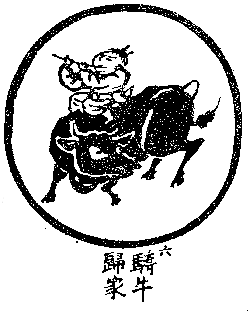Case 65 never ends, and so we ride to Case 66, Kyuho's Head or Tail ...
Can you make heads or tails of this one? (Couldn't resist that one). Maybe, we can just flip a no-sided coin!
In any case, I concur with Shinshin Wick that this case is about the "Head" of the Absolute and "nothing to attain, nothing need be done" Emptiness, and the "Tail" is about life out in the world and our need for Practice. Fall too much into one aspect or the other, and one is lost. There is need for proper balance and interpenetration, for the head is just the front of the tail, and the tail the back of the head. In truth, this Animal is both its Head&Tail, they are not two, and one cannot really Live and Thrive by just one or the other alone ... for that would cut the cat in two, and this sword of Wisdom cuts by uniting!

One awakens as a Light so bright and immanent, that one cannot speak of a separate dawn apart ... and yet that alone is blindness and not precious if one seeks to attain and remain so alone. One must return to the precious "nothing special special" of this ordinary world.
But on the other "sound of one hand clapping" hand:
Do not just sit there forever like a disembodied head, and we need to get up and "get down" to getting 'er done in life shaking a leg and moving our tails. But if we are just satisfied or complacent with this ordinary world without encountering the Wholeness and Wisdom of enlightenment, we are lost too and trip over our tails. Shinshin Wick says it also means "having a strong practice but no realization". He talks about "Buji Zen", which he says means believing "Since everything is perfect as it is, I don't have to Practice ... because I am already enlightened." This "Buji Zen" is sometimes also defined as ...
Buji Zen - False zen practice. Those who rationalize "since Buddha-Nature is intrinsically with us, there is no need to practice Zazen", neglecting all the effort needed to overthrow delusion.
Shohaku Okumura, one of the great teachers around today, talks of the head and tails double sickness of either chasing after enlightenment or being complacent and not practicing ...
The first kind of sickness [as found in Zen practice] is sometimes called buji Zen. Buji means “nothing matters;” an “everything-is-OK” kind of Zen. The second sickness is the belief or attitude that we need to practice in order to attain enlightenment as some kind of fancy experience, after which everything becomes OK — that we have no problems at all after such an enlightened experience. This is the belief that, at a point, we become so-called enlightened persons.
These are two basic sicknesses in Zen practice, according to Dogen.
https://buddhismnow.com/2014/12/05/p...ohaku-okumura/
This "Though satisfied, you are powerless" might also be pointing to a kind of "Bompu Zen", which is a complacent practice seeking ... not Realization ... but just a little relaxation and escape, maybe even other worldly benefits like greater work efficiency ... but no real insight into the heart of the Buddhist Teachings.
Bompu zen, or "usual zen," means engaging in a meditation practice in order to procure the same kinds of things that one has always been looking for; that is to say health and happiness, some sense of well-being. There is nothing wrong with wanting to develop a sense of health and well being. We are not saying that any of these approaches to practice are "wrong"; it is just that some of them are more limiting than others. To limit oneself when it is not necessary is like tying your own hands. ...
Your head is lost, stuck up your tail where the sun don't shine.
In any case, the trick is to find the lovely balanced and whole dance of head and tail together as one ...
One is then all the Buddhas and Ancestors come to life, their head just your head, their tail you tail, and it is just the most natural thing ... nothing special.
The Preface seems to say that even someone who had all kinds of "supernatural power" of "marvelous activity" couldn't get how wonderful this most ordinary is. But if you get lost in the absolute, forgetting the "world of externals" or even "eliminating thoughts" (some forms of meditation even encourage a kind of extreme practice of eliminating all human thoughts and emotions), you are stuck and "can't lift a foot" to get on to life. Either extreme, and you are either running dead or sitting dead. So, it asks, "How can they be made complete?"
The Appreciatory Verse seems filled with many traditional images of opposites and the hidden or lifeless brought to life ... the relative and absolute, like a square or circle each in its place yet with need for all in its measure ... are woven together like the warp and weft of the threads of the loom, making the entire tapestry of life ... a stone women comes to life and weaves and a wooden man travels as the moon of enlightenment travels through its phases of hidden and half and full. "Stupid and bumbling: a bird dwelling in reeds" must learn to fly free, leaving no traces through boundless sky.
Riding another creature of head and tail ... not caught or bound by any fence ...

Question: Can you live with this balanced dance of head and tail? Is your head either lost in the clouds chasing "enlightenment", or are you just chasing your own tail in this rat race of a world? Do you feel that you can avoid the pitfalls of Buji Zen or Bompu Zen?
Gassho, J
Can you make heads or tails of this one? (Couldn't resist that one). Maybe, we can just flip a no-sided coin!

In any case, I concur with Shinshin Wick that this case is about the "Head" of the Absolute and "nothing to attain, nothing need be done" Emptiness, and the "Tail" is about life out in the world and our need for Practice. Fall too much into one aspect or the other, and one is lost. There is need for proper balance and interpenetration, for the head is just the front of the tail, and the tail the back of the head. In truth, this Animal is both its Head&Tail, they are not two, and one cannot really Live and Thrive by just one or the other alone ... for that would cut the cat in two, and this sword of Wisdom cuts by uniting!

Attention!
A monk asked old Master Kyuho, "What is the head?"
Kyuho said, "Opening the eyes and not being aware of the dawn."
...
The monk then asked, "What about having the head and no tail?"
Kyuho said, "After all, it's not precious."
A monk asked old Master Kyuho, "What is the head?"
Kyuho said, "Opening the eyes and not being aware of the dawn."
...
The monk then asked, "What about having the head and no tail?"
Kyuho said, "After all, it's not precious."
But on the other "sound of one hand clapping" hand:
The monk asked, "What is the tail?"
Kyuho replied, "Not sitting on an eternal seat."
...
The monk asked, "What about having the tail and no head?"
Kyuho replied, "Though satisfied, you are powerless." {an alternative translation: "Being complacent, yet having no power."
Kyuho replied, "Not sitting on an eternal seat."
...
The monk asked, "What about having the tail and no head?"
Kyuho replied, "Though satisfied, you are powerless." {an alternative translation: "Being complacent, yet having no power."
Buji Zen - False zen practice. Those who rationalize "since Buddha-Nature is intrinsically with us, there is no need to practice Zazen", neglecting all the effort needed to overthrow delusion.
Shohaku Okumura, one of the great teachers around today, talks of the head and tails double sickness of either chasing after enlightenment or being complacent and not practicing ...
The first kind of sickness [as found in Zen practice] is sometimes called buji Zen. Buji means “nothing matters;” an “everything-is-OK” kind of Zen. The second sickness is the belief or attitude that we need to practice in order to attain enlightenment as some kind of fancy experience, after which everything becomes OK — that we have no problems at all after such an enlightened experience. This is the belief that, at a point, we become so-called enlightened persons.
These are two basic sicknesses in Zen practice, according to Dogen.
https://buddhismnow.com/2014/12/05/p...ohaku-okumura/
This "Though satisfied, you are powerless" might also be pointing to a kind of "Bompu Zen", which is a complacent practice seeking ... not Realization ... but just a little relaxation and escape, maybe even other worldly benefits like greater work efficiency ... but no real insight into the heart of the Buddhist Teachings.
Bompu zen, or "usual zen," means engaging in a meditation practice in order to procure the same kinds of things that one has always been looking for; that is to say health and happiness, some sense of well-being. There is nothing wrong with wanting to develop a sense of health and well being. We are not saying that any of these approaches to practice are "wrong"; it is just that some of them are more limiting than others. To limit oneself when it is not necessary is like tying your own hands. ...
Your head is lost, stuck up your tail where the sun don't shine.

In any case, the trick is to find the lovely balanced and whole dance of head and tail together as one ...
The monk then queried, "How about when head and tail are directly well matched?"
Kyuho responded, "A descendent gains power without knowing it."
Kyuho responded, "A descendent gains power without knowing it."
The Preface seems to say that even someone who had all kinds of "supernatural power" of "marvelous activity" couldn't get how wonderful this most ordinary is. But if you get lost in the absolute, forgetting the "world of externals" or even "eliminating thoughts" (some forms of meditation even encourage a kind of extreme practice of eliminating all human thoughts and emotions), you are stuck and "can't lift a foot" to get on to life. Either extreme, and you are either running dead or sitting dead. So, it asks, "How can they be made complete?"
The Appreciatory Verse seems filled with many traditional images of opposites and the hidden or lifeless brought to life ... the relative and absolute, like a square or circle each in its place yet with need for all in its measure ... are woven together like the warp and weft of the threads of the loom, making the entire tapestry of life ... a stone women comes to life and weaves and a wooden man travels as the moon of enlightenment travels through its phases of hidden and half and full. "Stupid and bumbling: a bird dwelling in reeds" must learn to fly free, leaving no traces through boundless sky.
Riding another creature of head and tail ... not caught or bound by any fence ...

Question: Can you live with this balanced dance of head and tail? Is your head either lost in the clouds chasing "enlightenment", or are you just chasing your own tail in this rat race of a world? Do you feel that you can avoid the pitfalls of Buji Zen or Bompu Zen?
Gassho, J




Comment